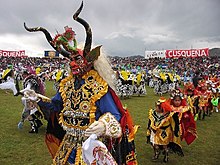This is an old revision of this page, as edited by ReMaY 85~enwiki (talk | contribs) at 14:56, 12 August 2009. The present address (URL) is a permanent link to this revision, which may differ significantly from the current revision.
Revision as of 14:56, 12 August 2009 by ReMaY 85~enwiki (talk | contribs)(diff) ← Previous revision | Latest revision (diff) | Newer revision → (diff)

The Diablada is a dance, with auto sacramental origins in Spain that is practised in various regions of the Andes specially the Altiplano (Bolivia, southeastern Perú, and nortern Chile). However, the dance is also practiced in Venezuela, Ecuador and Panama.
On XVI century, the jesuits, start "autos sacramentales", a dramatic representation of the mystery of the Eucharist in Juli - Puno, thats why this city was call "little Rome of America" or "Aymaras Rome". Until XVI century, Puno was part of the viceroyalty of Río de la Plata and then of the viceroyalty of Perú. During the evangelism of the lupacas who used to live in Juli, the jesuits made a representation of the seven deadly sins, with the angel winning.
The diablada causes a reform in the thinking of the indigenous altiplano cultures as missionaries from Spain, instilled the paradigm of good and evil, which is how the costumes of angels and demons became associated with the dance.
See Also
This dance-related article is a stub. You can help Misplaced Pages by expanding it. |